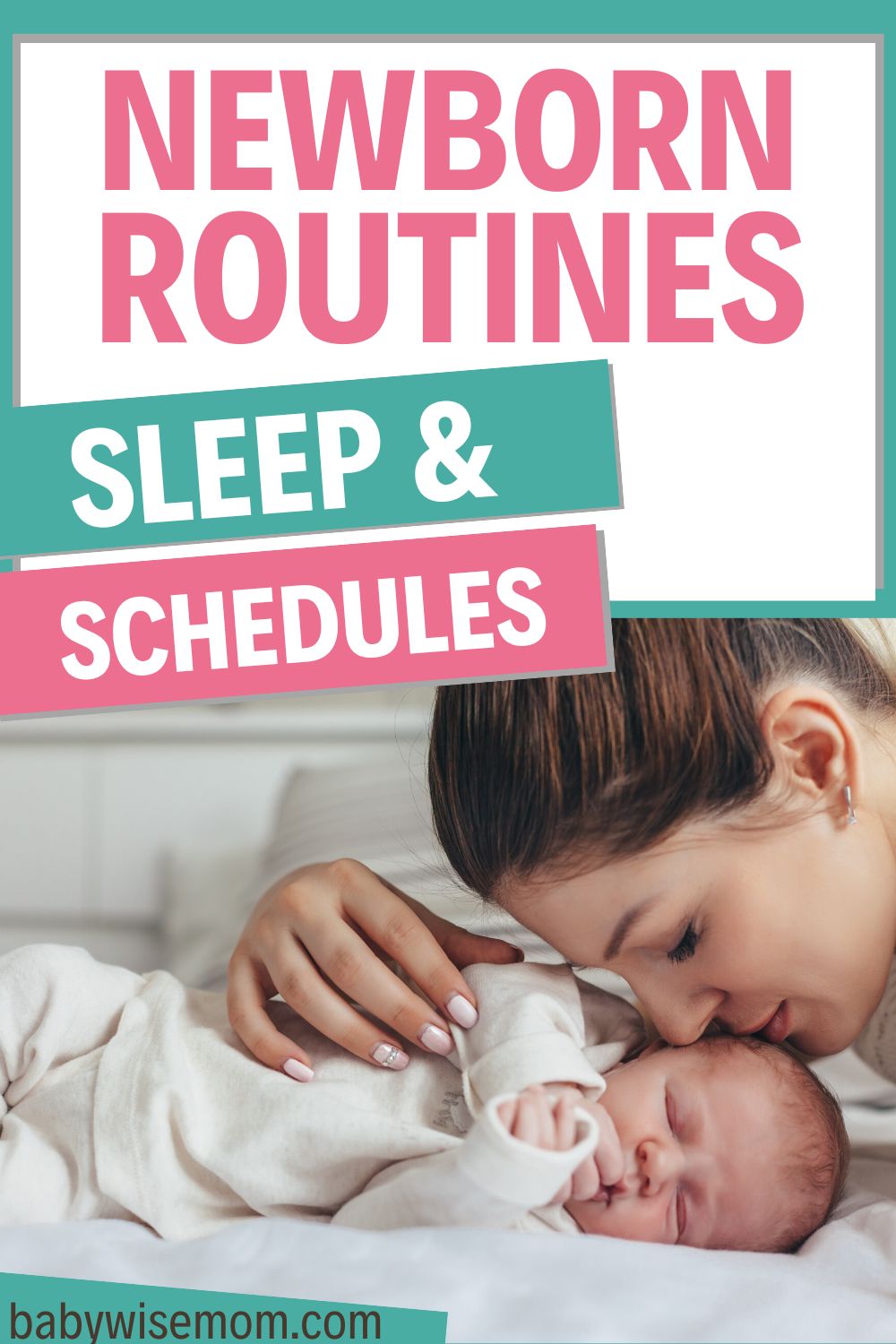Newborn routines to help your new baby sleep well. Tips for getting a solid routine or schedule down and what to do during play time.

While some newborn babies are super easy, most are not. Newborn routines will help you meet the needs of your sweet new baby and leave everyone commenting on how lucky you are that your baby is so easy.
In this post, I will share routines for sleep, schedules, playtime, and bedtime to help you get baby sleeping and eating well. I will also discuss how to handle disruptions that are sure to come up.
Post Contents
- Newborn Sleep Routines
- Daytime Sleep Totals
- Night Sleep Totals
- Newborn Sleep Patterns
- Sleep Cues
- Sleep Training Newborns
- Newborn Not Sleeping Well
- Nap Routines
- Newborn Schedule Routines
- Daily Routine Overview
- The Eat Portion of Your Newborn’s Routine
- Wake Time Length or Wake Windows
- Sample Newborn Routine (aka Schedule)
- Become a Schedule PRO
- Thank you!
- Newborn Playtime Routines
- Newborn Bedtime Routines
- Managing Disruptions to Routines
- Conclusion
- Related Posts
Newborn Sleep Routines
When it comes to newborn sleep, you will break things up into to major categories: naps and night sleep.
Newborn babies sleep a lot. They sleep most of the time. The first three months of life are often referred to as the fourth trimester because the baby is basically still just sleeping and growing like mad.
Daytime Sleep Totals
Do not be concerned when your newborn sleeps the vast majority of the 24 hour day.
You can expect your newborn to take 6-8 naps during the day. Each nap will be about 1.5-2.5 hours long. You might have a short nap for the last nap of the day (30-60 minutes long).
As your newborn gets older, individual sleep needs will emerge and there will be more variance in sleep totals, but most newborns just need a lot of sleep.
Night Sleep Totals
Your newborn will sleep in the night other than feeding times. Newborns can vary a lot on how many feedings they need in the night.
If you do a final late evening feeding (called a dreamfeed) around 10 PM, you will likely have 1-2 more feedings in the night (assuming you have enough daytime feeds. See more on that below).
There will be some babies who need 3 feedings in the night.
>>>Read: Babywise Newborn Night Feeding Schedule
If you find your baby is wide awake during the day and super sleepy at night, read on how to Fix Your Baby’s Day/Night Confusion.
Newborn Sleep Patterns
There are some things to know about newborns and sleep.
- Newborns are noisy when they sleep
- Babies have a sleep transition every 45 minutes. They might wake at this point, but should go back to sleep to finish the nap
- Newborns cannot be awake long between naps. This includes feeding time
That is a very basic list. I have an entire post that discusses these and more in depth. Read it here.
It is also important to know how light affects sleep. Light helps set the circadian rhythm and the lack of light cues the release of melatonin.
>>>Read: Circadian Rhythm Explained and How It Impacts Sleep
Sleep Cues
There are a lot of sleep cues that tell you that your baby is ready for a nap. Crying is actually one of the last cues given and often means it is later than ideal for nap to start.
Common sleep cues include:
- Yawning
- Red skin around eyes
- Staring into space
- Fussines
>>>Read: Baby Sleep Cues and How to Get it Right for Your Baby
Sleep Training Newborns
Ideally, you are working toward your newborn being able to fall asleep independently. This can be done quite easily using the Gentle Sleep Training 4 S’s Method.
Newborn Not Sleeping Well
Despite your best efforts, your newborn might not sleep well at times. Make sure you are familiar with My Sleep Hierarchy For Newborns so you know what to do when your baby has a hard time sleeping.
Nap Routines
An important part of successful naps is having a consistent nap routine for your newborn. Newborn nap routines can include:
- Diaper change
- Swaddling
- Gripe water or gas drops
- Cuddle time
- Lullabies
- Infant massage
- White noise
- Read a book (nursery rhymes are great for babies)
- 4 S’s
- Rocking until drowsy
Read more about sleep routines in Sleep Routine Ideas to Get Your Baby Sleeping Well and Sample Nap Routines for Baby
Newborn Schedule Routines
With your newborn, you will want to follow an eat/wake/sleep pattern during the day.
This means that you feed your baby. Then your baby has playtime (more on that below). Then your baby sleeps.
It is important to know that the time it takes to eat is included in “playtime”, or wake time lengths (also called wake windows).
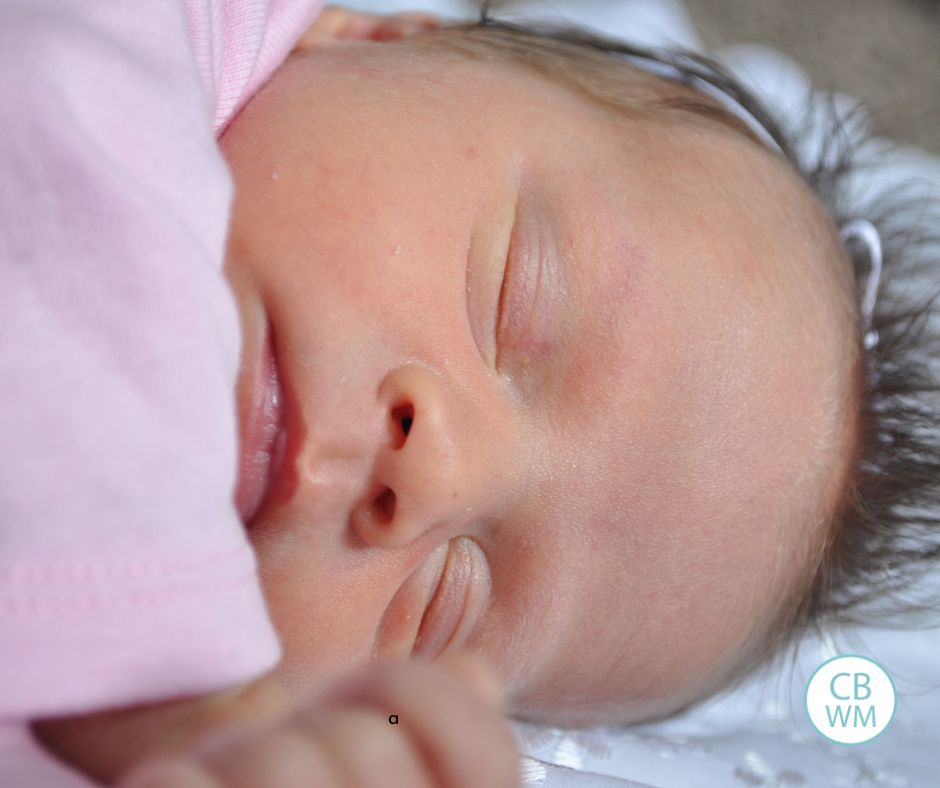
Daily Routine Overview
This is what your newborn’s day should look like each day. It is important to be as consistent as possible:
- Wake up each morning at a consistent time
- Eat
- Playtime
- Nap (1.5-2.5 hours long)
- Repeat Eat/Wake/Sleep until the evening. 8-10 feedings in a 24 hour period. 6-8 naps in a day.
- Possible Cluster Feeding (see How To Use Cluster Feeding to Get Baby Sleeping All Night)
- Bedtime
- Dream Feed around 10-11 PM (see The Basics of a Dreamfeed)
- Night sleep broken up with night feedings. A newborn can go 5 hours between feedings, but might also need to eat every 2.5-3 hours
The Eat Portion of Your Newborn’s Routine
As I said, your newborn should get 8-10 feedings in a 24 hour period. This is true whether your newborn drinks breast milk or formula. Most of these feedings will happen in the daytime.
>>>Read: How To Tell if Baby is Getting a Full Feeding
You can help keep feedings more in the day and less in the night by sticking to the eat/wake/sleep cycle. A dream feed is also very helpful for helping baby to go longer through the night that you are sleeping.
If your baby seems to need even more, look into cluster feeding to help tank up baby for night sleep.
Wake Time Length or Wake Windows
A newborn cannot be awake for long before needing to go back down for a nap.
Remember that feeding time is included in awake time in a baby schedule.
You do want to make sure your newborn is not napping while you are feeding her. This will lead to poor sleep and throw the cycle off.
>>>Read: How Long Should a Newborn Feeding Last?
Newborn wake windows are as follows (on average):
- 30-50 minutes for 0-4 weeks old
- 40-60 minutes for 4-6 weeks old
- 40-70 minutes for 6-8 weeks old
- 50-80 minutes for 8-12 weeks old
Getting wake time length down correctly is absolutely vital to successful naps. For that reason, I have several posts to help you out. These are MUST READS.
- How To Accurately Calculate Baby Wake Time Length
- How Long Should a Newborn Be Awake Between Naps
- When and How to Extend Baby’s Wake Time Length
- Adding Waketime to Your Newborn’s Day
- How to Calculate Waketime When Baby Wakes Early
Sample Newborn Routine (aka Schedule)
Here is a sample newborn routine. This is the basic outline I aimed for with my babies.
7:30 AM – wake up and feed
8:10 AM – nap time
10:30 AM – wake up and feed
11:10 AM – nap time
1:00 PM – wake up and feed
1:50 PM – nap time
4:00 PM – wake up and feed
4:50 PM – nap time
6:30 PM – wake up and feed
7:30 PM – bedtime
9:00–10 PM – dream feed
Then a newborn would wake 1-2 times in the night to eat.
I have posts detailing schedules for each month of baby’s first year. Here are the posts for newborn months. These posts tell you want to expect for each month and give several real schedules used by real babies.
- Babywise Sample Schedules: The First Month
- Sample Babywise Schedules: One Month Old
- Sample Babywise Schedules: Two Months Old
- Sample Babywise Schedules: Three Months Old
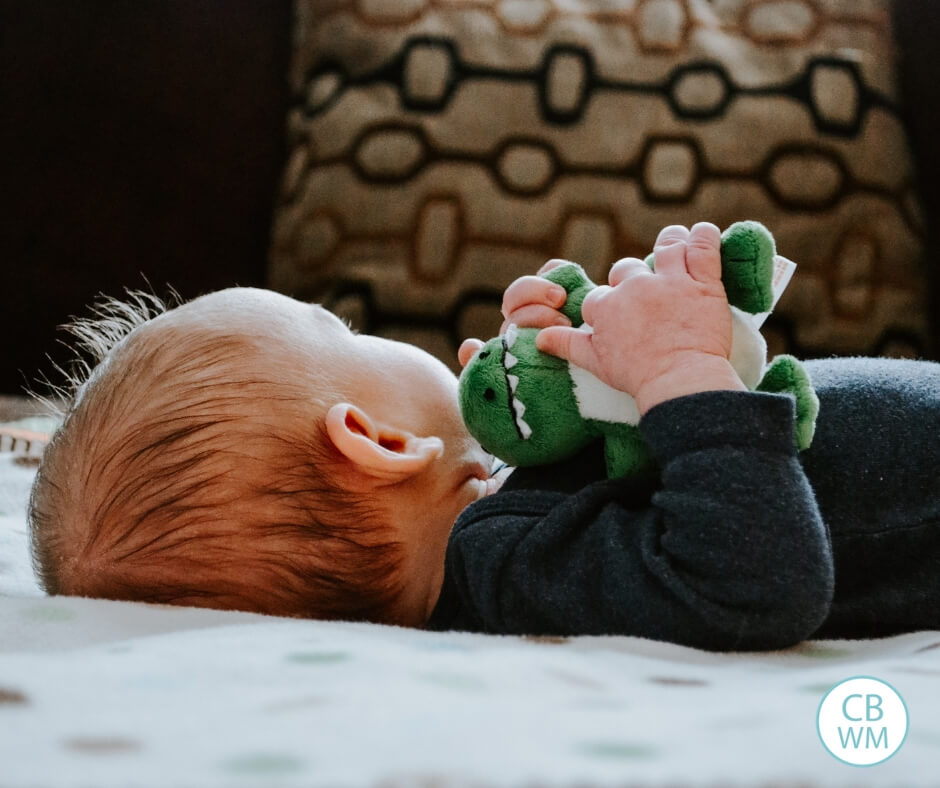
Newborn Playtime Routines
Play time will be short and very limited for newborn babies. Most of their “play time” will be spent in feeding and diaper changes. You will also have hygiene care like bathtime.
When your newborn does have time for playing, make sure you keep it calm and quiet. You want to avoid over stimulation. If your little one is over stimulated, she will not sleep well.
Tummy time is an important part of playtime each day.
>>>Read: How To Do Tummy Time Even if Baby Hates It
An activity gym or play mat is another great option for young babies.
See my post Best Toys for Baby: Ages 0-3 Months for all of my play ideas for toys for this age group.
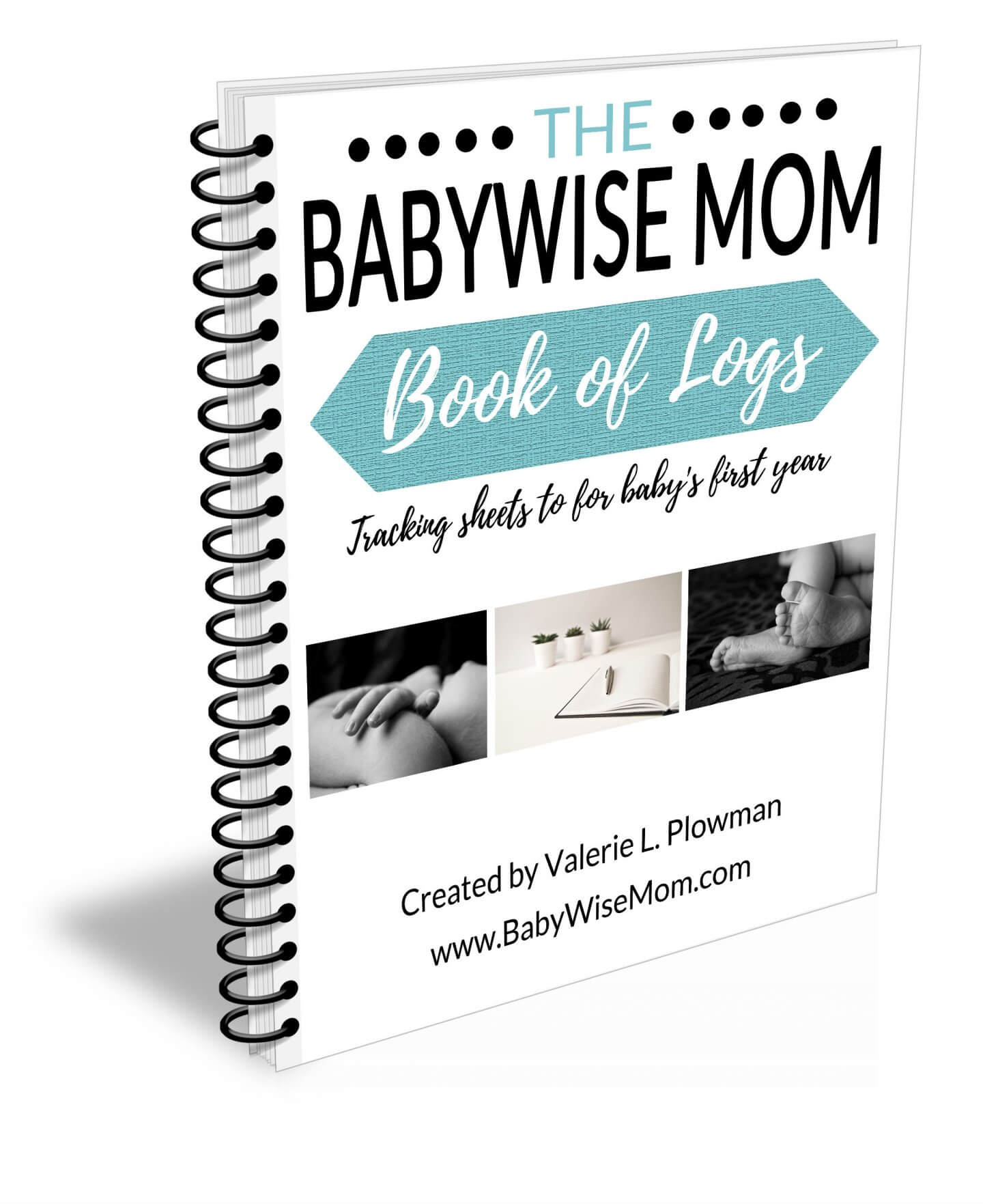
Newborn Bedtime Routines
For a young baby, the bedtime routine will look basically the same as a nap routine.
>>>Read: Perfecting Your Babywise Bedtime Routine
You will want bedtime to be about 12 hours before your desired morning wake up time. You will still have a dream feed after the bedtime. Consider that time baby goes to sleep in the 7PM-ish hour to be bedtime.
>>>Read: Importance of Consistent Bedtime
You might also have a cluster feed to help your baby get enough feedings in a 24-hour period.
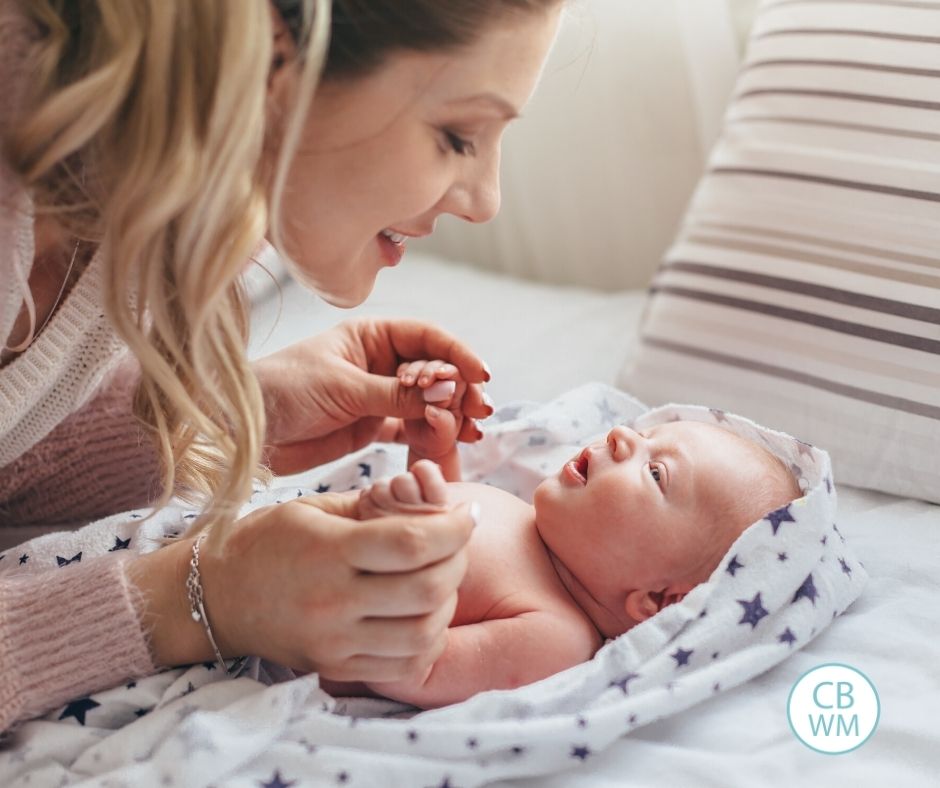
Managing Disruptions to Routines
Babies are born into real life, and that means disruptions will come. There will be visitors, holidays, travel, doctor appointments, growth spurts, and disruptions from othe family members, just to name a few.
You want to try to balance disruptions with consistency. If all your baby has is disruptions, it will be basically impossible to set up a routine.
Growth spurts disrupt your routine and there is nothing you can do to stop that (and you wouldn’t want to!).
Witching hour hits some newborns and completely disrupts the evening hours each day.
>>>Read: How To Manage Baby’s Dreaded Witching Hour
Here are some posts to help you manage disruptions:
- How To Expertly Manage Disruptions to Your Baby Routine
- Tips for Feeding Baby and Napping Away From Home
- How To Go Out With Your Baby Without Disruption
- Managing Baby Plus Older Kids’ Activities
Conclusion
There is a lot to learn and take in when you have a newborn baby. This post will help you with the various newborn routines you will want to implement.
Related Posts
- Reasons for Feeding Baby Sooner than 2.5 Hours
- Newborn Baby Life: Everything You Need to Know
- Brinley Newborn Summary: Week One
- McKenna Newborn Summary: Week One
- Best Things…Newborn 0-3 Months
